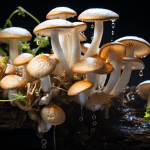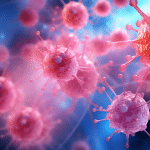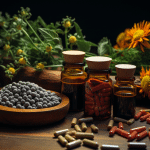I like mushrooms, and can consume a lot of them. But I know that many people do not like mushrooms, and it could possibly be due for a genetic reason. For some people who have gut problems and a particular gene variation, mushrooms may make those problems worse. If you are a person who has had bowel problems after eating mushrooms, maybe your genetic variation contains the explanation of the cause.
A Mushroom or Ergothioneine Intolerance
For some, eating mushrooms may cause gut symptoms like cramps, bloating, or diarrhea. Crohn’s disease is a severe inflammatory condition that attacks the gut lining. It can cause stomach pain, fatigue, diarrhea, and weight loss. For some people, this is a chronic condition, but for others, it can only appear occasionally.
An interesting study published in the British Journal of Nutrition looked at a few foods that triggered gut problems in inflammatory bowel diseases, mostly Crohn’s disease. The participants of the study were a group of Crohn’s patients from New Zealand, and a control group who did not have Crohn’s. The researchers were looking at interactions between diet, symptoms of illness, and genetics.
The main foods found to worsen gut symptoms were maize and mushrooms. Corn is a known allergen, and it is the common trigger for many people.
The connection with mushrooms, however, is due to a particular compound found in mushrooms, and a particular gene. Researchers linked a group that was not sensitive to mushrooms with a genetic variant of the OCTN1 gene, which has been linked to increased risk for Crohn’s disease (without any cause).
The OCTN1 / SLC22A4 gene and Ergothioneine Intolerance
The OCTN1 gene (now known as SLC22A4) encodes an organic cation transporter, meaning that it moves positive-charged solutes through the plasma membrane. Specifically, SLC22A4 moves ergothioneine, a compound found in abundance in mushrooms, across the plasma membrane. In addition, SLC22A4 also moves gabapentin, with variants described below that affect gabapentin disposal.
You can find our favorite ergothioneine supplement on the following pages of our website and learn more about each individually:
What is ergothioneine intolerance?
Ergothioneine has been a topic of much study recently because of its antioxidant properties and its potential role in helping to combat cardiovascular diseases. Researchers are looking at it as a beneficial factor, with the potential to use as a supplement. Which could be a good thing for some people.
Ergothioneine is a compound that is synthesized naturally by bacteria and fungi. We naturally get some ergothioneine in our diets, just a little bit. Specific soil fungi and bacteria make ergothioneine, which is taken up by the roots of certain plants.
Our primary source of food containing ergothioneine are mushrooms such as white buttons, shiitake, portobello, and oysters, just to name a few. Other food sources that provide some ergothioneine include tempeh, liver, black and red beans, and oat bran. Interestingly, other foods that were listed as the main culprits for Crohn’s disease, as mentioned earlier, included baked beans, chickpeas, and dried beans.
The SLC22A4 variant associated with Crohn’s in the study referenced above, as well as mushrooms intolerant in people with Crohn’s, causes an upregulation of function, with 50% increased ergothioneine (ET) transport. While we typically think of antioxidants as something that should be consumed in large amounts, this study found that higher levels of ET may result in antioxidant over-representation in the red blood cells or the epithelium, leading to pro-oxidant effects and/or immune reactions being unbalanced. An alternate possibility could be effects on pro-inflammatory cytokines or Heat Shock Protein 70.
Researchers looking at developmental genetic traits have found certain gene variants associated with the transition of humans from a hunting/gathering society to one based more on agriculture. Some researchers have speculated that this gene variant, SLC22A4, is an adaptation by European populations to guard against an ergothioneine deficiency due agriculture-based diets developing over the years.
What are the symptoms of mushroom and ergothioneine intolerance?
Symptoms of ergothioneine intolerance may include:
- Swelling experienced around the lips, mouth, and throat
- Skin rashes or hives
- Runny nose
- Watery eyes
- Nausea
- Diarrhea
- Bloating or stomach cramps
How do you treat mushroom intolerance?
As of now, most doctors would administer an antihistamine to relieve the distress caused by a mushroom intolerance.
Learn more:












